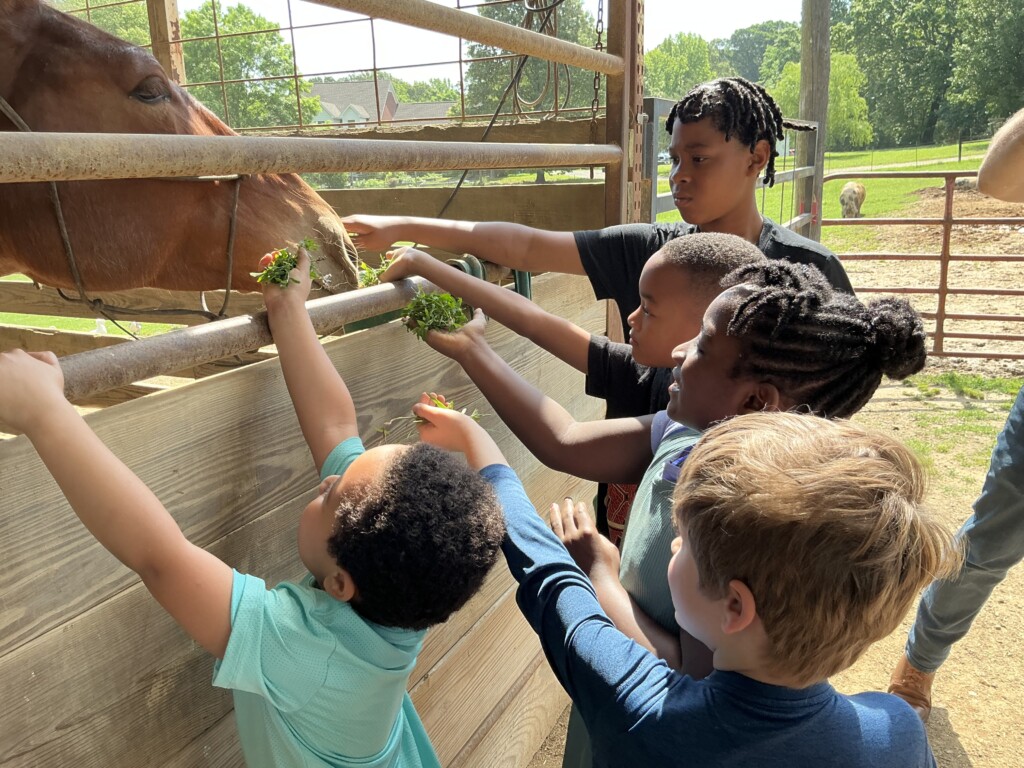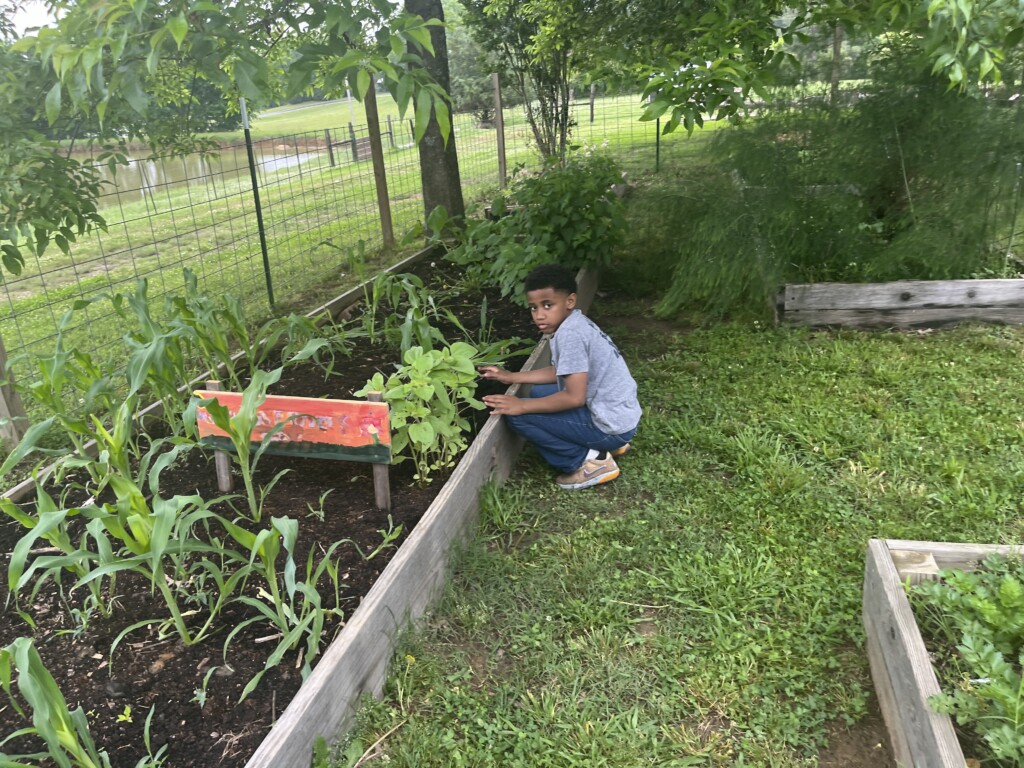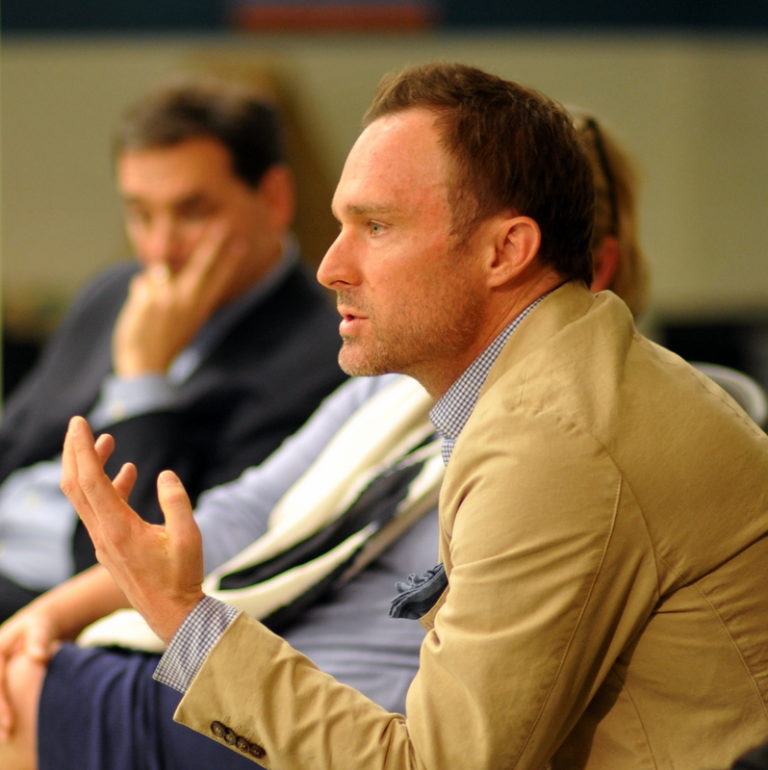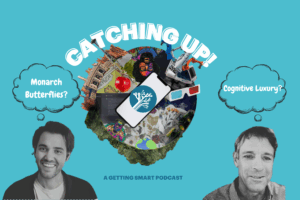In Tennessee, a Memphis Mash Up Is Reimagining How Children Learn
Key Points
-
Microschools, like the Lab School of Memphis, emphasize learner-centered, holistic approaches that foster curiosity, self-knowledge, and personalized growth.
-
Partnerships with local organizations, like Gnarled Oak Farm, enrich learning experiences and build community connections, showcasing the value of experiential education.

Like a lot of young children, five-year-old Geo is a spinning top.
Bright and mischievous, his arc through the world corresponds to a pattern of one, something his mother, Rosi Lara, sees clearly. So when Geo neared school-age, his mom struggled to find any place where she felt confident he would thrive.
Ultimately, that search led her to enroll Geo in a fledgling new school, the Lab School of Memphis, that was housed in a former church—and felt like the answer to her prayers. “The teachers here really see my son,” she told me, while Geo took my pen and notebook to draw a giant whale. “The place has brought it all together for him.”
Fittingly, that place was founded by a fellow mom who, just a few years earlier, had faced the same problem.
An educator herself, Coi Marie Morefield knew what a great early learning environment should look and feel like. As a recent Memphis transplant, however, she was unfamiliar with her adopted city’s schools. So she began researching the local options, before ultimately settling on a well-regarded private school with progressive roots.
Almost immediately, she realized she had made a mistake.
“After the first parent-teacher conference,” she told me, “the school called me into the office to explain that it’s clear my sons learn best by doing, and that they needed them to do a better job of sitting quietly on the rug.”
For Morefield, a kinetic polymath with a clear vision of what education’s ultimate purpose should be, that was all she needed to hear. “They didn’t see my children and their unique rhythms. They were more interested in compliance than curiosity. So I started looking again.”
What Morefield was seeking was a mash-up of education’s greatest hits: the holistic, outdoors-y approach of Waldorf, say, with the grade-less vibe of Montessori, the arts infusion of Reggio, and a pinch of unschooling’s radical embrace of individual freedom.
Not surprisingly, she couldn’t find it.
So she decided to create it.
And in August 2021, the Lab School of Memphis (LSM) opened its doors for the first time—with two adults, six kids, and an evocative tagline: Where Memphis Meets Tomorrow.

What Coi Marie had created was a microschool—a small, innovative learning environment that exists outside of education’s more traditional systems (there are now more than 125,000 such places across the country). Aside from its size, however, the Lab School’s unifying feature was its roots in constructivism.
“In this theory,” Morefield explains, “learning is viewed as an active process in which learners construct knowledge as they seek to understand the world around them. Constructivist theory rejects learning as simple memorization in favor of supporting understanding, application, and competence.”
In such a place, adults need to act as guides more than teachers. Questions need to be treated as more valuable (and interesting) than answers. And the driving force must not be content knowledge, but self-knowledge—and the never-ending pursuit of a meaningful life of one’s own choosing.
Four years later, the Lab School’s burgeoning vision has grown to support a community of more than sixty learners—ranging from as young as three to as old as thirteen. And now, after partnering with another longtime Memphis educator, Anthony Anderson, Morefield believes its gradual expansion “will demonstrate a better way to inspire youth curiosity, marshal civic resources, and forge deeper connections throughout the city.”
That influence is already extending beyond the boundaries of Bluff City—now that LSM has joined Education Reimagined’s national cohort of twelve sites that are striving to create learner-centered ecosystems.
Recently, I spent a few days there to see what made it so special.
The Lab School, borrowing from the Montessori model, organizes itself via mixed-age “learning studios.” The youngest (like Geo) are in Spark. 1st and 2nd graders are in Wonder, while 3rd through 5th graders are in Discover (LSM also has a middle school, on a separate campus).
“We use the mornings to focus on core skills work,” explained LSM’s head of curriculum, Sarah Hooker. “There’s also daily 1-on-1 learning, and independent time. But the bulk of our program is organized around group projects, which we call Quests. Each one lasts about 4–6 weeks, and is organized around a guiding question.”
To ensure that every Quest is well designed, LSM has partnered with a national non-profit called Rock by Rock, which provides a library of engaging projects for schools to consider. The day I was visiting, Rock by Rock’s founder, Jeff Imrich, was, too. “The problem is that we don’t have a good shared mental model of what we want the future of learning to look like,” he told me. “That’s the problem that LSM is addressing.”
For its final Quest of the year, the school had organized a massive garage sale, and tasked each studio with a different responsibility, and a different question. Spark was managing inventory. Wonder was working on ensuring great customer service. Discover was handling all the marketing and advertising. And the middle schoolers were deciding what to do with the proceeds.
In the background, as each Quest unfolds, LSM’s guides are actively documenting each child’s learning through a platform called Headrush. “Two years ago,” Hooker said, “we spent all summer combing through the standards for each grade band and pulled out the big concepts we wanted to explore, which Headrush turns into our learning targets.”
Similar to what you see in a Reggio school, adults here are constantly taking photos and recording videos as a form of emergent documentation. Students are also evaluated on a four-point continuum: Awareness, Training, Integrating, and Coaching. “We made coaching the highest because we’re community-oriented here, and we want to encourage young people to share what they’ve learned with others.”
What they don’t want to do is make kids perform for adults in the usual ways in order to show what they know. “That can be a shock to some of our parents,” confessed Anthony Anderson, LSM’s new leader. “But when you’re trying to do some things differently, you have to be prepared for a lot of other things to look differently too.”
Later that morning, a group of LSM parents described what those differences felt like.
“It was a little nerve-wracking at first,” said Anide Francis-Duval, the mother of six-year-old Adelaide, “because it was different from what we were used to. It required a little reimagining of education for us both. But we saw the light in our daughter, of just wanting to learn, and we want to keep that light burning for as long as we can.”
Geo’s mother, Rosi Lara, agreed. “I’ve needed to change my expectations of what school should look like. I had always thought school was about achievement. Now I know what I’m looking for is growth—and seeing whether my son is truly thriving. That’s my measure of success now.”
That afternoon, I witness first-hand what Rosi means, when Geo and twenty other learners board a bus and head across the border, to Mississippi, for another of the school’s core components: Forest School.
Every LSM student makes this journey once a week, for a mixture of structured and unstructured activities on the verdant, slightly overgrown landscape of the Gnarled Oak Farm.
We arrive through a swinging metal gate, and enter a world of loquacious farm animals and majestic oak trees. Instantly, the children forage for rocks, transform sticks into tools, and extend their arms to pet the farm’s two placid horses, Thunder and Lightning. Nearby, the sheep bleat and the geese honk, while another group of children yelp excitedly after discovering a particularly robust ant colony.
For Gnarled Oak’s owners, Sarah and Kevin Varble, the partnership with LSM fulfills a different mission. “Being a part of the community is really important to us,” Sarah says, while Geo chases one of her cats across the yard. “I love sharing our farm and talking with the children about what we do.”
For Coi Morefield, that sort of partnership is what being a learner-centered ecosystem is all about. “We knew we needed to get our kids outside, learning skills, and practicing risk-taking. And while the logistics of making something like this happen are challenging, the gift of our effort is changing the trajectories of our students.”
Indeed, what makes schools like LSM special is their unapologetic embrace of experiences like this as a necessary condition for holistic growth and development. “We have forgotten,” writes the philosopher Josef Pieper, “that the Greek word for leisure, scholē, is the root of our word school—not as a site of vocational training, but a space for contemplative stillness. Leisure ensures that the human being does not disappear into the parceled-out world of his limited work-a-day function, but instead remains capable of taking in the world as a whole, and thereby to realize himself as a being who is oriented toward the whole of existence.”
Sure enough, when the day shifts to a more structured activity, Geo prefers to keep roaming. In time, his path intersects with Mr. Anderson, who is fishing in Gnarled Oak’s pond.
He is instantly transfixed.
“I can do anything,” Geo says confidently, before Anderson places the rod in his hands.
“OK then,” he says patiently. “Just swing it a little bit, Geo. Now we’re going to hold it.”
“I’m fishing!” He squeals, his voice rising just above the sound of the wind rustling through the branches overhead.
Moments later, a plump catfish emerges from the bottom of the pond’s ruddy waters. Geo touches its slippery skin and gazes into its open mouth.
No one ever asks him to sit still.
This article is part of a series highlighting sites from Education Reimagined’s Learner-Centered Ecosystem Lab. In collaboration with writer, filmmaker, and global design consultant Sam Chaltain, Education Reimagined is showcasing the development of learner-centered ecosystems in communities across the United States.






0 Comments
Leave a Comment
Your email address will not be published. All fields are required.